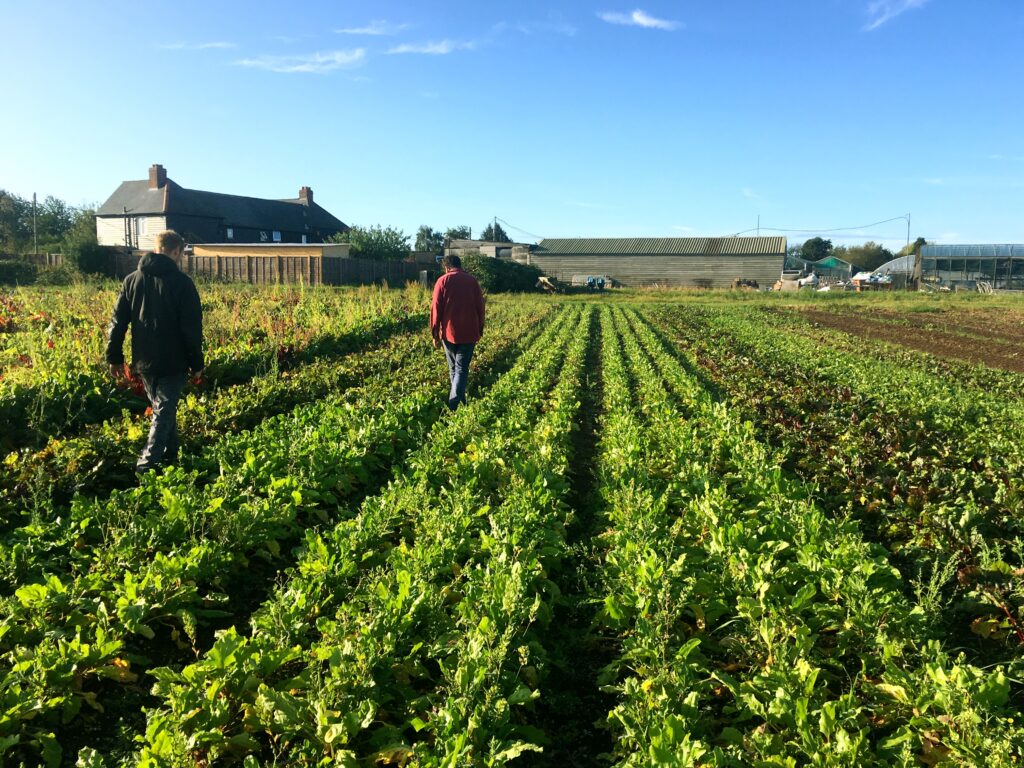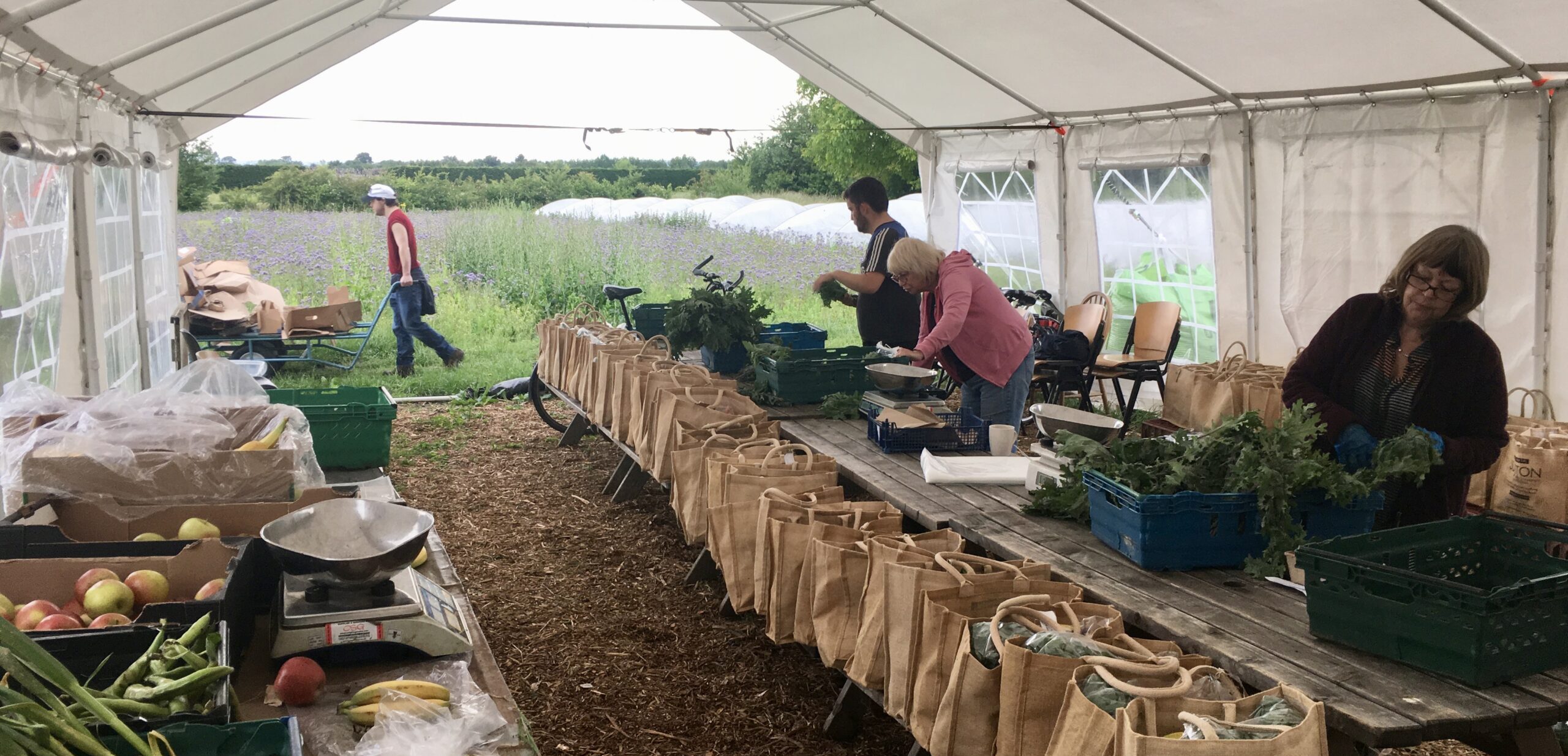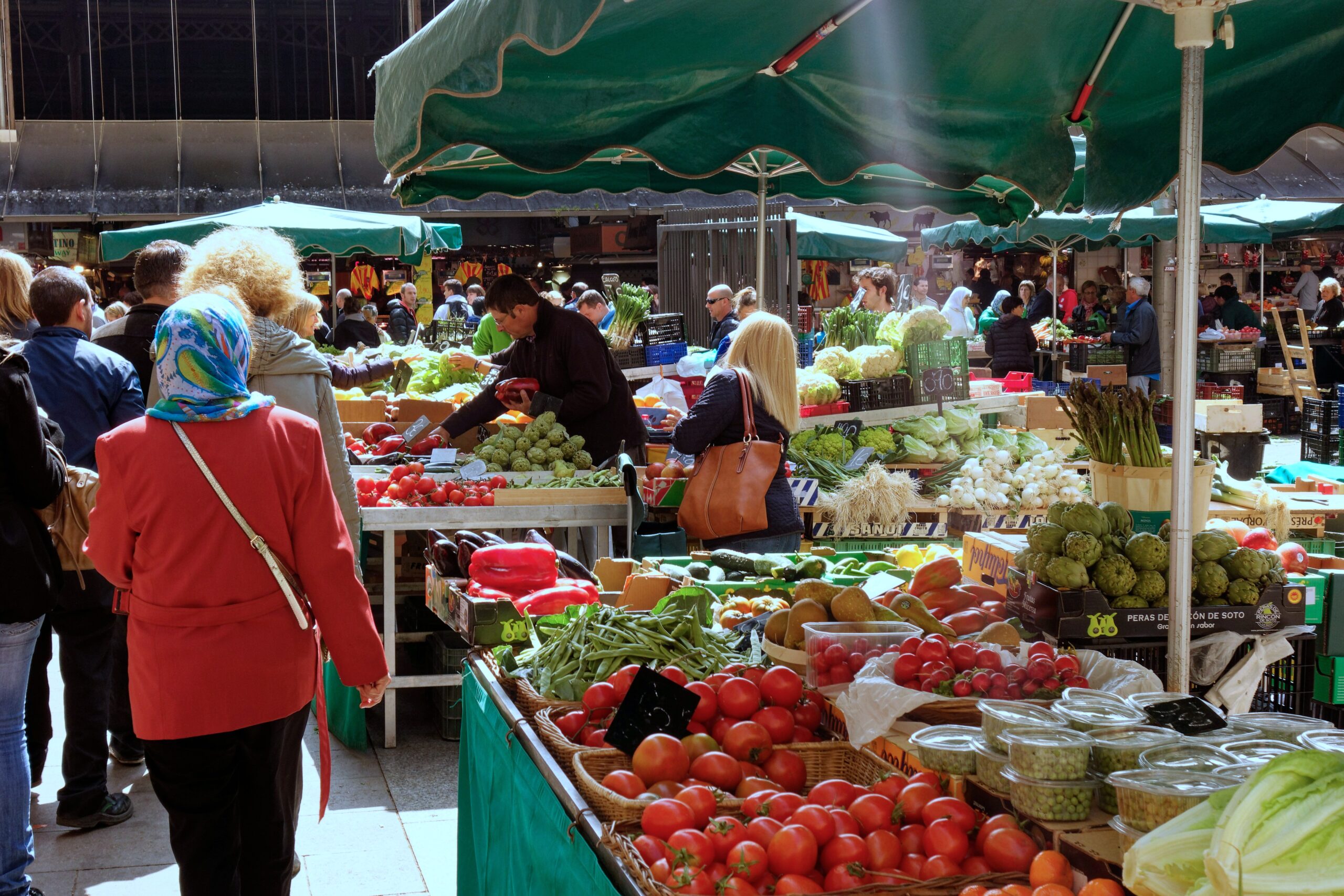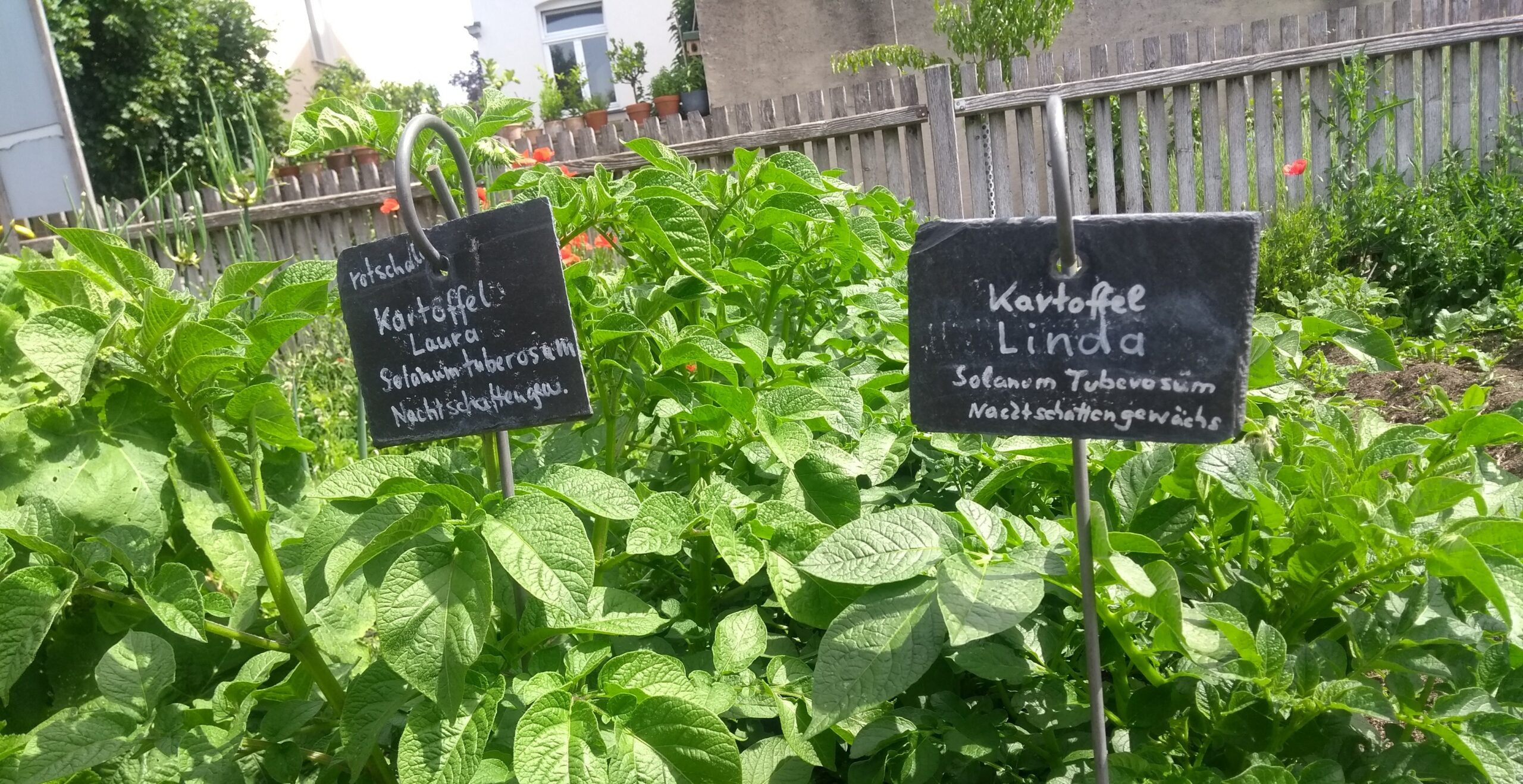Authors: Victoria Schoen (University of Kent) and Chris Blythe (Social Farms & Gardens)
As the UK went into COVID-19 lockdown in March 2020, many community gardens in London stepped up as emergency food providers, despite unclear government advice on whether they could continue operating. Highlighting the flexible, community-centred approach of such gardens, as well as the mental and physical health benefits of gardening, this blog post makes the case for including community gardens in the national post-pandemic recovery plan.
In March 2020, as COVID-19 took hold in the UK and restrictions tightened, the public panicked and stripped supermarket shelves – firstly of non-perishable goods, then of fresh fruit and vegetables. In a social media appeal, a critical care nurse, after finding supermarket shelves empty at the end of a shift, pleaded with the public to stop the panic buying. A YouGov poll found that of the 8.1 million people in the UK facing food insecurity, 50% were unable to obtain the food they needed because of shortages in shops. All the major grocery chains adapted, introducing the rationing of certain products and queueing to allow for social distancing, and the situation started to calm.
However, those empty produce shelves suggested an opportunity for community gardens and farms to up their game, expand production, and distribute produce to those in need. But, paradoxically, just at the time their produce was needed, it was unclear whether ‘community’ gardens would be able to remain open.
The Cabinet Office minister, on 24 March, clarified the rules for allotments, allowing their opening and highlighting their many benefits such as exercise, fresh air and fresh produce. Outdoor parks were also allowed to remain open as long as those attending did not stay for prolonged periods and observed social distancing rules. But no specific advice was issued for community gardens during the pandemic, which by their very nature include an element of social interaction.
Many surveys have been carried out on the response to COVID-19 by the community gardening sector. One survey conducted by Sustain in April 2020, found that 39% of gardens and city farms (mostly in London) closed, but the remainder managed to stay open with various staffing and social distancing measures in place. Some 70% planned to grow and harvest food in 2020 and a few planned to grow more than usual.
Diversity of response by London community gardens
A small number of case study community gardens and farms in London and the south east of England that were already collecting data for a European-funded FEW-meter project on urban agriculture resource efficiency[1], reported on the impact of COVID-19 on their operations. The diversity in responses and the impressive results reflected the multiplicity of types of operation in England, with each farm and garden meeting the needs of the different communities that they serve:
- Sutton Community Farm in Wallington was overwhelmed in March by the surge in demand for vegetable boxes, up 50% from just before lockdown. Sutton transferred its usual restaurant supplies to home deliveries and adjusted its growing schedule to incorporate more of what normally goes into its boxes, and less fine leaf lettuce for restaurant clients.
- Calthorpe Community Garden in Camden normally directs its produce to its onsite café. With the café closed, it started to run a weekly food bank for vulnerable people and families in need. Boxes were filled with donated food and fresh vegetables from the garden. It also started a ‘growing at home’ group, sending seeds to members and helping them grow vegetables at home.
- Cranbrook Community Food Garden, a small community garden in Tower Hamlets serving local residents, stopped its usual practice of selling small amounts of produce from the garden gate and instead donated them to those in need in the local community.
- The community garden at Castle Climbing Club in Hackney diverted produce that would normally supply its onsite café to the newly established ‘Castle Food Service’, a small group of local residents and staff at the Climbing Centre who worked together as an emergency food provider in response to the COVID-19 crisis.
These are just a few examples of small urban initiatives using garden produce to do good for the local communities in which they are situated. But community gardens in the UK are not just about kale and carrot growing. In fact, a recent study suggests that the health and wellbeing outcomes of these spaces are worth three times the value of the funds invested in garden establishment and upkeep, and the financial value of the fruit and vegetables produced.

Community gardens and community health and resilience?
COVID-19 has caused a significant increase in mental ill-health as a result of lockdown. It has also been suggested that the chance of survival from the virus is reduced for patients who are obese, leading to recommendations in the newly launched National Food Strategy Part One and Public Health England’s Better Eating strategy.
Gardening, which saw an increase in uptake during lockdown, has a role both in reducing mental health symptoms and in tackling obesity.
In a National Garden Scheme survey, 88% of respondents agreed that access to their garden or other outdoor space during lockdown helped to relieve stress and anxiety, thus contributing to their mental wellbeing. Moreover, 69% found that such access helped to keep them fit, contributing positively to their physical health.
Testimonies from several of the case study gardens involved in the FEW meter study also emphasised the mental health benefits of gardening:
‘Gardening is an essential element to the mental wellbeing of many of our volunteer gardeners, so it was a top priority to find a way to stay open safely, as the mental health of our community was also at risk in this pandemic’.
‘Horticultural therapy and meaningful daily activities are more important than ever in times of crisis. It would have been dreadful to tell our service users that they could not attend at a time when they needed us most’.
‘The mental health of people is really important to us and since we are located in central London, for many of our service users we are the only option to enjoy nature in a safe environment’.
A growing role for community gardens?
Community gardens in London have demonstrated their niche role during the pandemic in terms of food provision to those in need locally and in providing a safe outdoor space for those with mental health illness. Those gardens that depend on grants and trusts for income have weathered the pandemic better than those that are, in pre-COVID times, more financially self-sufficient. Many gardens are dependent on the income they receive from the activities that they normally run, café sales and corporate away days and they are starting to feel the strain from the inability to generate such income during the crucial growing months of 2020.
It is time to review the role that these spaces have played in the pandemic and to assess their growing potential in the ‘new normal’ policy arena. Community gardens and other forms of urban farming have the potential to play a role in the three main policy areas that normally receive focus from the UK government: health, climate change and environment, and community cohesion/development. A recent FAO briefing highlights the need for better integration of food and health systems into urban policies and plans. As the UK rebuilds its health and economy post-pandemic, community gardens should have a role in any recovery plan, as a means of contributing to both food supply and community resilience in times of crisis. Their role in providing health and social support should be formally acknowledged, and they should be financed accordingly. Moreover, gardening should be seen as a serious measure to tackle the UK’s obesity crisis and related COVID-19 mortality impact.
Reference:
[1] The FEW-Meter project is a five country study , funded under the NEXUS FOOD-WATER-ENERGY call, (JPI Urban Europe https://jpi-urbaneurope.eu/calls/sugi/) to investigate the use of energy, water and other resources on case study farms and gardens in five countries (UK, US, Poland, France and Germany). The project will model the resource flows of urban agriculture, allowing the identification of methods to improve efficiency on-farm and also at a city scale. See http://www.fewmeter.org/en/home/.






